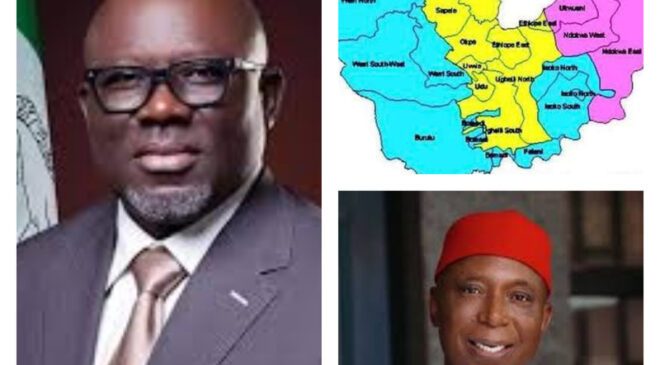
Delta! The amalgamation of five strong and vibrant ethnic groups on August 27, 1991, birthed a state rich in diversity. A state steeped in a continuous search for self-identity, as each group jostles for organic attention — a human experience the Indian historian, Sandalal Nanda, once termed “competitive communalism.”
Two distinct discourses have in recent times shaped an evolving Delta. The politics ahead of the 2027 governorship election and the renewed agitation for Anioma State — both generating animated interest. On 2027, the debate has been particularly intense, the anticipation of tomorrow running high among Deltans.
The events of April 23, 2025, energized the political mood in Delta. On that day, Governor Sheriff Oborevwori, immediate past governor Senator Dr. Ifeanyi Okowa, and other leading politicians, alongside their supporters, defected from the Peoples Democratic Party (PDP) to the All Progressives Congress (APC). That dramatic shift reconfigured the political landscape, effectively ending 26 years of PDP dominance in Delta. Earlier, on February 5, 2025, Senator Ned Nwoko (Delta North) had also decamped to the APC, joining Senators Ede Dafinone (Delta Central) and Joel Onowakpo (Delta South) to form a complete APC senatorial troika. Given the PDP’s national leadership crisis, Delta’s swing seemed like a jump away from a ticking time bomb. To the state’s political establishment, nothing could have been more mollifying than the augury of a new dawn under the APC-led Renewed Hope Agenda. This shift appears more about collective survival than the protection of prebendal power interests at the state level.
Delta’s survival has always rested on the devolution of the governorship seat, given its controversial origin and complex ethnicity. Whether by human arrangement or providence, a power rotation structure has sustained the state since 1999 — rotating among Delta Central, Delta South, and Delta North, the three senatorial districts that constitute the state. Chief James Ibori blazed the trail, governing from 1999 to 2007, followed by Dr. Emmanuel Uduaghan (2007–2015) and Senator Dr. Ifeanyi Okowa (2015–2023). Each served two terms of eight years. Every man his turn, every senatorial district its slot.
Here lies the fortune of the man of the moment, Governor Sheriff Oborevwori. Currently in his first four-year term, the historical precedent suggests Delta Central, his senatorial district, is due for another four years — before power rotates to Delta South. History stands as a reliable witness; propriety points Oborevwori toward a second term to complete Delta Central’s slot. So far, gubernatorial rotation has been a soothing balm for a convoluted state. Sheriff has been forthright in office, with visible strides in infrastructure and social welfare. Power often corrupts, but thus far, he has remained humble in service and purposeful in delivery — qualities that explain his broad goodwill across the state.
2027 remains in the womb of time, tucked in the secrecy of the unknown, enveloped by divine will. Mortals can only speculate and wait. Yet, the conscience of a future calm Delta nudges Oborevwori forward — not just for political correctness in rotation, but for the rectitude of leadership.
On the agitation for Anioma State, the push flies on the wings of equity and memory. Kudos to Senator Ned Nwoko (Delta North), who has reignited the most vibrant glow in a movement that began over 70 years ago. It is the oldest state creation agitation in Nigeria’s history, pioneered by Sir Dennis Osadebay, first premier of the Midwest Region, and later sustained by other Anioma leaders. Nwoko has invested much — time, intellect, energy, and resources — to propel this renewed quest. His public declaration of disinterest in contesting the governorship of a potential Anioma State deepens the nobility of his sacrifice. He has been making wide consultations and must continue to open more doors and build bridges.
Though debate rages on whether Anioma should fall under the South-South or South-East, the idea itself is just and genuine. Ultimately, a referendum and the government of the day will decide. Enlightenment, not emotion, should guide the resolution. Anioma, if created, will be a win-win: Delta will gain by producing two governors, more political offices, and greater development opportunities.
For Governor Oborevwori, there is little to lose. If Delta is restructured before 2027, he stands positioned to lead in the carved-out territory. If the state remains intact, he has one of the brightest chances to continue into a second term, taking Delta Central’s slot to 2031.
In a multiparty democracy, contest is everyone’s right, but power ultimately comes from above. He who owns all power dispenses human fate in His infinite grace. Away, then, with recriminations over 2027 and the Anioma agitation. As Chinua Achebe counseled: “Let the eagle perch, let the kite perch…”
Peace!
Caveat emptor : All vibes strictly my reflections.
Chiazor is a veteran Journalist & Media leader
